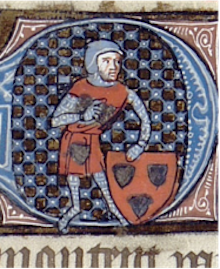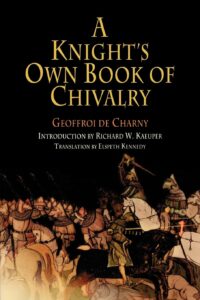Chivalry
The mind-set of medieval knighthood
Sometimes, but rarely, a historical document illuminates a figure so wonderfully that they leap the centuries. They land before us fully-formed and resplendent, with a crump of armoured boots in our modern dust. They stride into our world of dishonoured leaders and speak to us of the high ideals of chivalry.
Geoffroi de Charny
 Meet Geoffroi de Charny, who died a hero’s death as the French standard bearer at the battle of Poitiers in 1356. He was cut down clutching the the oriflamme, the sacred banner of France, to the last. Among the French nobility of the time, de Charny not only epitomised knighthood but had – literally – written the book. His Book of Chivalry was intended to re-invigorate the French warrior class, widely seen as degenerate and lacking in military prowess, at a time when the Hundred Years’ War was raging and France had suffered a series of defeats at the hands of English and Gascon armies.
Meet Geoffroi de Charny, who died a hero’s death as the French standard bearer at the battle of Poitiers in 1356. He was cut down clutching the the oriflamme, the sacred banner of France, to the last. Among the French nobility of the time, de Charny not only epitomised knighthood but had – literally – written the book. His Book of Chivalry was intended to re-invigorate the French warrior class, widely seen as degenerate and lacking in military prowess, at a time when the Hundred Years’ War was raging and France had suffered a series of defeats at the hands of English and Gascon armies.
I came across de Charny while researching how a medieval knight would have thought and behaved. I wanted to shape a character in the novels that would become the Rune Song trilogy. De Charny’s book, translated by Elspeth Kennedy and brilliantly introduced by Richard W. Kaeuper (Univ. of Pennsylvania Press, 2005) forced me to re-think my preconceptions.
A few surprises
 Forget any notion that chivalry was simply an elaborate kind of politesse, or a romantic dream of knight-errants being heroic to win a lady’s favour. It was a brutal, rigorous, warrior code, requiring absolute dedication to achieve prowess. And prowess, Charny writes, brings honour, the only truly worthwhile achievement. It was the gift of God, won with sword and lance, while holding one’s life lightly. ‘If you want to be strong and of good courage,’ he writes, ‘be sure that you care less about death than about shame’.
Forget any notion that chivalry was simply an elaborate kind of politesse, or a romantic dream of knight-errants being heroic to win a lady’s favour. It was a brutal, rigorous, warrior code, requiring absolute dedication to achieve prowess. And prowess, Charny writes, brings honour, the only truly worthwhile achievement. It was the gift of God, won with sword and lance, while holding one’s life lightly. ‘If you want to be strong and of good courage,’ he writes, ‘be sure that you care less about death than about shame’.
My second surprise was the expectation of piety. A knight should live his life well, so that if he suffered a mortal wound he could expect paradise. If he had fought in pursuit of a great deed of arms, ‘he cannot regret the blow’.
De Charny draws many comparisons between the lived-religion of a cleric and the life of a knight, though he insisted that the trials of knighthood were more rigorous than any religious order. Just as clerics found God through fasting and deprivation, a knight found honour through adversity; what Kaeuper calls ‘righteous suffering’. The ultimate reward for both was heaven. Earthly comforts were permissible to knights in moderation, but Charny is scathing about over-indulgence; ‘the man who for his greedy gullet fails to make a name for himself, should have all those teeth pulled out, one by one, which do him so much damage as to lose him the high honour he might have acquired…’
A touch of fanaticism
Charny writes of war not as a horror, but as a God-given opportunity to learn martial skills and a pathway to honour. ‘And when, through the grace of God, they find out and witness such supremely novel affairs as battles, were they also to be granted the grace and favour of performing great deeds, then such men should indeed thank Our Lord.’ To modern thinking, this smacks of fanaticism. Zealotry. I even caught a whiff of the jihadi in some passages. So was de Charny’s ideal like the Templars, the monkish warriors of earlier centuries?
And a (courtly) eye for the ladies
Not quite. Celibacy has little place among the laity in de Charny’s world, although his references to ladies dwells mainly upon their ability to inspire knights to greater prowess. He unashamedly hints at the possibility of dalliances, even love affairs. ‘There is more perfect joy in being secretly in the company of one’s lady than one could have in a whole year, were it to be known and perceived by many… the most secret love is the most lasting and the truest.’ I found nothing to suggest he saw any inconsistency between this view and his piety.
Honour before riches
Unlike the vows of poverty expected of a religious order, a knight could acquire riches, provided his over-riding purpose was honour. ‘One should therefore set one’s heart and mind on winning honour, which endures for ever, rather than on winning profit and booty, which one can lose within one single hour.’ The true knight sought the greatest honour, not the greatest profit.
It is a theme that surfaces many times. A knight must gain his wealth honourably, for ‘unsullied poverty is worth more than corrupt wealth’. Riches must also be held lightly. ‘The more worldly goods a man acquires, the more reluctant he is to die and the greater his fear of death; and the more honour a man gains, the less he fears to die, for his worth and honour will always remain, and the worldly goods will disappear.’
Influence on the Rune Song trilogy
Those who have read the Rune Song trilogy will by now have recognised de Charny’s influence on the character of Humbert Blanc. Blanc is a courageous, decent, and occasionally infuriating knight. He’s a warrior who is humble in victory but accepting of adversity; his piety tells him that all that happens is the will of God. If you haven’t begun Rune Song, I suggest you start with Hammer of Fate.
Did de Charny ‘regret the blow’ as he felt his mortal wound on the lost field of Poitiers? I hope not. He lived, and died, by his own ideals. One thing is certain; the modest wealth of the de Charnys has long since passed away, but thanks to this excellent book, his fame and honour shine brightly.
Amazon links
You’ll find de Charny’s Knight’s Own Book of Chivalry on Amazon UK or Amazon.com
Hammer of Fate, like all the Rune Song trilogy, is published by Second Sky, an imprint of Bookouture / Hachette. It is available in paperback, audiobook, and ebook formats including Kindle Unlimited. It is also on Amazon UK or Amazon.com.
I am a member of Amazon’s Associates Programme and receive an infinitesimally small portion of purchases made through the UK link.